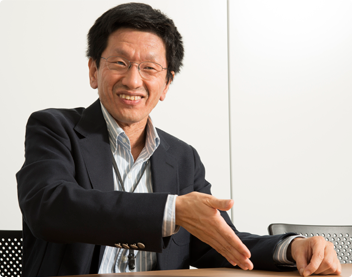The value of thinking and finding solutions by oneself
As a researcher and as a leader of an organization.

You became a manager at quite a young age.
I have always been a person who would never agree with something unless convinced of its veracity. I've never hesitated to have thorough discussions, even with my superiors. When I took charge of a job that I was convinced of, though, I would energetically proceed with it, actively distributing tasks in my department and organizing consultations with other departments to build a cooperative relationship. While I may have been somewhat annoying at times, I might have also been recognized as the person most effective for organizing my department, I guess.
What do you think about being in a management position?
Some researchers might say they find a management job boring because managers can't constantly devote themselves to research. However, I obtain great pleasure from working out a direction for an organization while watching over the work of my staff. I train them hard, wishing all of them to become the brains of Nikon's optical theories.
Question everything at first. It leads to true understanding.
Do you have any principles about training your staff?
I repeatedly tell my staff that they should never blindly accept common beliefs and theories. They must question them and confirm them for themselves. Only after this process will the knowledge become their own. If I notice a staff member proceed without questioning anything, I will stop them and question them thoroughly (laughter).
It sounds quite a tough principle.
I may be tough but I don't believe it's annoying. Unless the deadline is just around the corner, I would never give directions or advice to my staff. I give tips only when they are at a complete impasse and come to me for consultation.
A problem usually has many different solutions. If I told them what to do every time they have a hurdle to overcome, it would be dealt with my particular way. I expect them to think thoroughly for themselves to originate their own independent solution that I would never imagine.
Does that mean that you respect their individuality?
I highly value motivation. A certain amount of failure should be forgiven for that reason. There is a huge difference between spontaneous action and forced action. I want them to completely think things through on their own, no matter what. The outcome may sometimes be wrong, but as long as they have their own reasoning behind it, I encourage them to present it with confidence. Then I always ask, "Is this closed?"
What do you mean by that?
It is the state achieved when a researcher is completely convinced of a theory after the most thorough examination. I call this "closed." Every time a member of my staff presents a solution to a problem, I ask, "Is this closed for you?" If it's not, I severely question why.
So an "unclosed" solution is subject to sharp questioning from you?
Yes. I also instruct them not to be satisfied with just one solution or way of understanding. If they can create at least two or possibly three alternatives, it will add to their own knowledge. Then they'll be fine when being questioned by others. By understanding various aspects of a phenomenon from different points of view, you become able to speculate about other parts of the phenomenon, that are yet to be obvious to you. If you keep this in mind, your understanding of problems, and how to solve them, progressively deepens.
